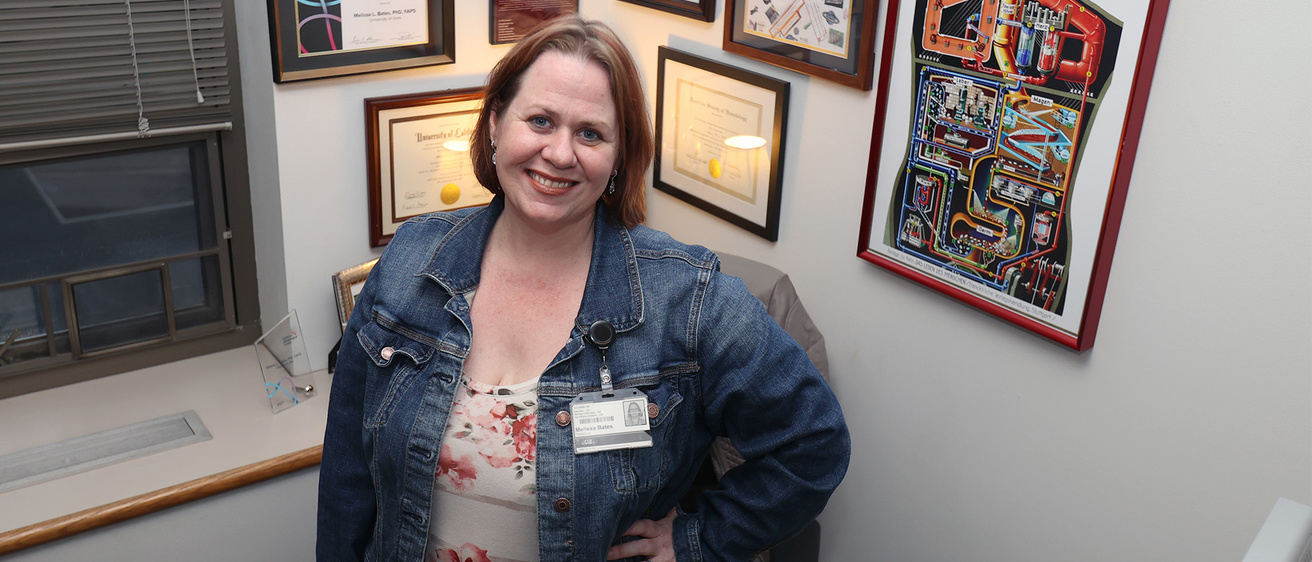Melissa Bates has spent more than 20 years studying the lungs. Armed with that knowledge, the University of Iowa associate professor and director of research operations in the Department of Health and Human Physiology realized that by the time someone developed symptoms of lung disease, the probability of reversing those symptoms decreased, and the probability of a hospital stay increased.
Those weren’t odds that made Bates comfortable, for the problem stuck with her for more than two decades before she reached out to the University of Iowa John Pappajohn Entrepreneurial Center (Iowa JPEC). That relationship has led to the growth of LSF Medical Solutions, a business founded by Bates. While she was in graduate school at Penn State University, Bates helped develop technology to measure the volume of the airways in lungs. She later refined and improved the technology at the University of Iowa. When COVID-19 hit, Bates thought about using that technology to start a business.
Here's why COVID-19 helped inspire her to found LSF Medical Solutions: During and after the pandemic, physicians became comfortable with remote monitoring and telehealth. Because of that, Bates and her crew could take their large piece of research equipment and miniaturize it into something patients could take home to monitor lung health and then transmit the data to a doctor. She was particularly inspired by patients she met in Iowa, where many communities do not have easy access to a lung specialist.
This is where Iowa JPEC stepped up.
“I worked in pharma before I went to graduate school, so I had a little bit of a business mind, but it never occurred to me that I was sitting on something I could commercialize until I saw an informational session about NSF I-Corps,” Bates said. “I went to it, and was like, Wow, it has changed how I think about what we do in the lab and the potential to bring [technology] to patients ourselves.”
Bates didn’t end her association with Iowa JPEC after participating in the NSF I-Corps Workshop in the spring of 2021. She also went through Venture School in 2022, the Graduate Startup Incubator in the spring of 2022, the Graduate Startup Incubator Summer Track in 2022, and competed in Innovation Challenge in the fall of 2022.
At the most recent Innovation Challenge, LSF Medical Solutions won a first-place prize for Best Technology Startup from Iowa JPEC for $20,000.
“I’m a huge Iowa JPEC fan,” Bates said. “The resources in terms of marketing, accounting, business plan development, and networking have been incredible. The seed money has helped. It has been fun to see that once Iowa JPEC identifies you as a good idea, it continues to support you and move you forward.”
At the 2022 Prometheus Awards in Des Moines, Iowa, LSF Medical Solutions was one of five finalists for the Startup Technology Company of the Year.
Originally from the Inland Empire area near Los Angeles, Bates received an undergraduate degree from the University of California-Riverside. She worked in Maine before enrolling in graduate school at Penn State. Bates did a fellowship at the University of Wisconsin-Madison and arrived in Iowa in 2014. Her specialization is in respiratory and pediatric physiology.
So far, LSF Medical Solutions is predominantly a family affair. Joining Bates is her husband and Chief Medical Officer, Michael Tomasson, MD, professor of internal medicine-hematology, oncology, and blood and marrow transplantation at the University of Iowa. She calls her daughter, Marcia, the Chief Smile Officer. Gregg Barcus, adjunct lecturer at Iowa JPEC, is their business consultant.
With a nudge from Iowa JPEC, Bates began fact-finding for her business. Could she commercialize the idea? The first 6-9 months were spent on customer discovery and making sure what she developed would have a home. But when it came time for Iowa JPEC pitch competitions, Bates really felt out of her element.
“Giving a business pitch was not natural for someone like me, it was terrifying,” she said. “During my first one, I almost passed out. Explaining this idea to people who are not scientists and physicians, and learning to communicate about what we are doing in a way that excites them, was a new skill for me. The first year and a half was doing that sort of work and realizing I’m pretty good at this professor talk, but I had lost my ability to communicate like a normal human.”
She acknowledges that working with Iowa JPEC has made her a better communicator.
The first issue LSF Medical Solutions solved was whether to initially develop the physical device or the technology platform. A hand-held mouthpiece is currently being produced; Data from normal breathing patterns is taken and a novel algorithm is applied to derive measurements of the lung’s structure.
Bates says her target audiences are people with chronic obstructive pulmonary disease, people who have had a lung transplant, and those who have had cancer.
“It has amazed me that there aren’t solutions in the lung health space like there are for cardiovascular and diabetes monitoring,” Bates said.
With her expertise — and a big assist from Iowa JPEC — that is about to change.
